The Sudanese coup in October 2021 is condemned by most Western countries and international organizations such as UN, EU and African Union. The coup was met with resistance from pro-democracy Sudanese civilians some of whom took to the streets of Khartoum as well around Sudan in protest; many banks, schools and businesses were closed.
It was predicted strong civilian resistance to the coup but the military however tooked the risk.Factors motivating the military to halt the transition to democracy might include their personal interests but one can not exclude some regions and economic aspects.
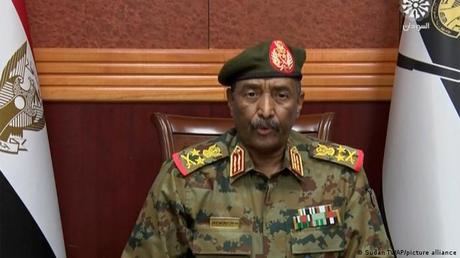
Abdel-Fattah Burhan, head of the Sudanese military, announced the army will run the country until elections can be held
" data-orig-size="700,394" data-image-title="59619418_401" data-orig-file="https://arirusila.files.wordpress.com/2021/11/59619418_401.jpg" data-image-description="" data-image-meta="{"aperture":"0","credit":"","camera":"","caption":"","created_timestamp":"0","copyright":"","focal_length":"0","iso":"0","shutter_speed":"0","title":"","orientation":"0"}" data-medium-file="https://arirusila.files.wordpress.com/2021/11/59619418_401.jpg?w=300" data-permalink="https://arirusila.wordpress.com/2021/11/07/sudanese-coup-and-some-regional-aspects/59619418_401/" alt="" class="wp-image-6833" data-large-file="https://arirusila.files.wordpress.com/2021/11/59619418_401.jpg?w=450" />Abdel-Fattah Burhan, head of the Sudanese military, announced the army will run the country until elections can be heldSudan is Africa’s third-largest country by area, and the third-largest by area in the Arab League and it has population of some 45 million people. Sudan’s history goes back to the Pharaonic period, but only on 1st January 1956, Sudan was duly declared an independent state. Since independence, Sudan has been ruled by a series of unstable parliamentary governments and military regimes.
Between 1989 and 2019, Sudan experienced a 30-year-long military dictatorship led by Omar al-Bashir accused of human rights abuses including torture, persecution of minorities, allegations of sponsoring global terrorism, and ethnic genocide due to its role in the War in the Darfur region that broke out in 2003.
On 19th December 2018, massive protests began against the rule of President al-Bashir, who finally was ousted on 11th April 2019 and his government was replaced by Transitional Military Council (later joint military-civilian Sovereignty Council of Sudan). Islam was Sudan’s state religion and Islamic laws applied from 1983 until 2020. An accord between the transitional government and rebel group leadership was signed in September 2020, in which the government agreed to officially separate the state and religion, ending three decades of rule under Islamic law. It also agreed that no official state religion will be established.
The Sudanese Coup
As of August 2021, the country was jointly led by Chairman of the Transitional Sovereign Council, Abdel Fattah al-Burhan, and Prime Minister Abdallah Hamdok. In October 2021 a military coup resulted in the capture of the civilian government including Prime Minister Abdalla Hamdok. The coup was led by general Abdel Fattah al-Burhan with help of general Mohamed Hamdan Dagalo (Hemetti), who was the Deputy Chairman of the Transitional Military Council (TMC).
General al-Burhan subsequently declared a state of emergency. The African Union suspended Sudan’s membership, pending a return to power of the Hamdok government. Also the European Union, the United States and other western powers stated that they continued to recognise the Hamdok cabinet as “the constitutional leaders of the transitional government”.
Before the October coup the Chair of the Sovereignty Council of Sudan was planned to be transferred to a civilian selected by the FFC civilian members of the Sovereignty Council in November 2021. The factors motivating the military to halt the transition to democracy might have included their personal risk of national or international war crimes charges and their risk of loss of military control of the national budget that could disrupt military-owned commercial interests and of losing control of the gold trade and other personal business.
Israel
Israel and Sudan began normalising their relations since sc Abraham Accords 2020. It tries to stabilize and develop cooperation with Sudan in long term basis. According to intelnews Israeli government officials, which likely included members of the Mossad spy agency, paid a secret visit to Sudan in the days prior to the October 25 coup d’état, but were given no indication of what was about to happen, according to reports from Israel.
According to the report, the Israeli delegation held several meetings with leading Sudanese government officials, among them Abdel Rahim Hamdan Dagalo (Hemetti), a general in Sudan’s notorious Rapid Support Forces (RSF) paramilitary group. The RSF was a leading actor in the October 25th coup, which resulted in the arrest of Prime Minister Abdalla Hamdok and most of his cabinet.
Unlike most Western countries have condemned the Sudanese coup, Israel has not issued any statements against the military takeover of power. The reason for this might be because the Sudanese military is the main supporter of normalizing Sudan’s relations with Israel. On the other hand, the civilian-led revolutionary movement, has been critical of Israel and has expressed strong support for the Palestinians.
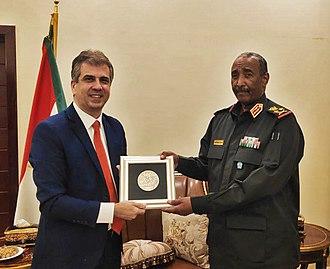
Burhan with Israel’s Minister of Intelligence, Eli Cohen, in January 2021
" data-image-title="Minishter_of_Intelligence_of_Israel_Eli_Cohen_and_President_of_Sudan_Abdel_Fattah_al-Burhan" data-orig-file="https://arirusila.files.wordpress.com/2021/11/minishter_of_intelligence_of_israel_eli_cohen_and_president_of_sudan_abdel_fattah_al-burhan-1.jpg" data-image-description="" data-image-meta="{"aperture":"0","credit":"","camera":"","caption":"","created_timestamp":"0","copyright":"","focal_length":"0","iso":"0","shutter_speed":"0","title":"","orientation":"0"}" width="258" data-medium-file="https://arirusila.files.wordpress.com/2021/11/minishter_of_intelligence_of_israel_eli_cohen_and_president_of_sudan_abdel_fattah_al-burhan-1.jpg?w=300" data-permalink="https://arirusila.wordpress.com/2021/11/07/sudanese-coup-and-some-regional-aspects/minishter_of_intelligence_of_israel_eli_cohen_and_president_of_sudan_abdel_fattah_al-burhan-2/" alt="" height="210" srcset="https://arirusila.files.wordpress.com/2021/11/minishter_of_intelligence_of_israel_eli_cohen_and_president_of_sudan_abdel_fattah_al-burhan-1.jpg?w=258&h;=210 258w, https://arirusila.files.wordpress.com/2021/11/minishter_of_intelligence_of_israel_eli_cohen_and_president_of_sudan_abdel_fattah_al-burhan-1.jpg?w=150&h;=122 150w, https://arirusila.files.wordpress.com/2021/11/minishter_of_intelligence_of_israel_eli_cohen_and_president_of_sudan_abdel_fattah_al-burhan-1.jpg?w=300&h;=245 300w, https://arirusila.files.wordpress.com/2021/11/minishter_of_intelligence_of_israel_eli_cohen_and_president_of_sudan_abdel_fattah_al-burhan-1.jpg 330w" class="wp-image-6825" data-large-file="https://arirusila.files.wordpress.com/2021/11/minishter_of_intelligence_of_israel_eli_cohen_and_president_of_sudan_abdel_fattah_al-burhan-1.jpg?w=330" />Burhan with Israel’s Minister of Intelligence, Eli Cohen, in January 2021Israeli officials visited Khartoum also a week after the military coup in Sudan,, meeting with Sudanese generals, including Mohamed Hamdan Dagalo (Hemetti), to assess the local situation. And weeks before the coup, Dagalo had travelled to Israel to meet members of the Israeli National Security Council and officials in the prime minister’s office.
The silence can be seen as a sign of support for the military. Sudanese security leaders have been seen as more active in normalisation efforts towards Israel than civilian members of the former government.
Israel has one special relationship to Ethiopia and Sudan as sc Aliyah from Ethiopia is the immigration of the Beta Israel people to Israel. In the absence of full diplomatic relations with Ethiopia, the Israeli Mossad contacted officials in Sudan, which is adjacent to Ethiopia. Thousands of Beta Israel from Ethiopia traveled by foot to the border with Sudan, and waited there in temporary camps until they were flown to Israel. Today there is ~160,000 people in Israel from Ethiopian origin.
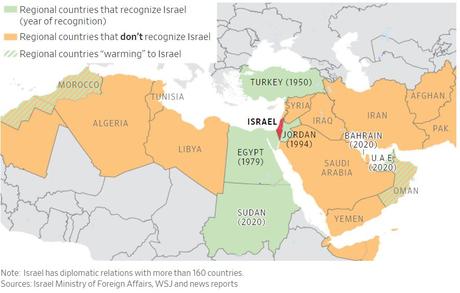
Tigray
Sudan and Ethiopia had peaceful relations for decades despite a long-standing border dispute over the agricultural area known as al-Fashaqa, which is adjacent to Ethiopia’s northwest Amhara region. But last November 2020, while the Ethiopian army was busy battling against the Tigray People’s Liberation Front (TPLF) rebels, the Sudanese army took control of the contested area.
In Ethiopia last November (2021), conflict broke out between the federal government of Prime Minister Abiy Ahmed and the Tigray People’s Liberation Front (TPLF), the governing party of the northern Tigray region that dominated Ethiopian politics until being sidelined by Abiy. Nearly 10 months later, the conflict has grown into a de facto civil war. According al-Jazeera, the fight spreads across the country, it is bringing with it famine, massive refugee flows, widespread civilian deaths and sexual assaults, and fears of ethnic cleansing.
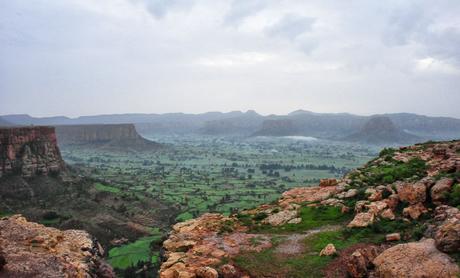
Tigrays’ landscape
" data-orig-size="888,538" data-image-title="Tigray,_Ethiopia_(8205210356)" data-orig-file="https://arirusila.files.wordpress.com/2021/11/tigray_ethiopia_8205210356.jpg" data-image-description="" data-image-meta="{"aperture":"0","credit":"","camera":"","caption":"","created_timestamp":"0","copyright":"","focal_length":"0","iso":"0","shutter_speed":"0","title":"","orientation":"0"}" data-medium-file="https://arirusila.files.wordpress.com/2021/11/tigray_ethiopia_8205210356.jpg?w=300" data-permalink="https://arirusila.wordpress.com/2021/11/07/sudanese-coup-and-some-regional-aspects/tigray_ethiopia_8205210356/" alt="" class="wp-image-6832" data-large-file="https://arirusila.files.wordpress.com/2021/11/tigray_ethiopia_8205210356.jpg?w=450" />Tigrays’ landscapeAccording the report of The Guardian (1st November 2021), Tigrayan forces said they had seized control of the strategic cities of Dessie and Kombolcha, positioning them to move down a major road towards Addis Ababa. Ethiopian government forces and their allies – e.g. from Eritrea – have been fighting against TPLF, for just over a year.
But the conflict has developed rapidly after the Ethiopians suffered a series of reverses since June, and the TPLF has recruited more allies to its cause.Eight other rebel groups, including the Oromo Liberation Army (OLA), announced they and the TPLF were joining forces amid growing speculation they will attempt to march on the capital following a series of military gains. The success of TPLF is remarkable as Tigray has population some seven million compared to Ethiopia with nearly 120 million population total.
GERD – Waterwar
Sudanese Coup and Tigray war are connected to so-far less intensive but potentially larger clash which has been brewing over control of the Nile River. After 10 years of construction, Ethiopia has begun filling the reservoir of the Grand Ethiopian Renaissance Dam (GERD). Ethiopia asserts that the GERD project, one of the world’s largest hydroelectric facilities, is necessary to meet the country’s growing energy needs. Downriver countries Sudan and Egypt, on the other hand, have warned that disruptions of the flow of the Nile River would be devastating. Khartoum and Cairo have demanded that Ethiopia share information and coordinate control of the dam’s operations with them, a request that Ethiopia has dismissed as a violation of its own sovereignty.
The primary purpose of the dam is electricity production to relieve Ethiopia’s acute energy shortage and for electricity export to neighboring countries. With a planned installed capacity of 6.45 gigawatts, the dam will be the largest hydroelectric power plant in Africa when completed, as well as the seventh largest in the world.
Filling the reservoir began in July 2020. It will take between 4 and 7 years to fill with water, depending on hydrologic conditions during the filling period. The second filling was completed on 19th July 2021, without the agreement of Egypt and Sudan.
Ethiopia’s prime minister Abiy Ahmed has remained intractable, and the Tigray crisis seems to have only hardened his resolve to reject negotiations or compromise over the GERD. Formally, Sudan and Egypt have pursued political and legal avenues to resolve the dispute, appealing to the UN Security Council and the African Union, among others, to intervene. More ominously, however, both countries have hinted that military action could be on the table if a peaceful solution is not achieved. Earlier this year, Sudan and Egypt held joint military drills, giving the exercises the unsubtle name, “Guardians of the Nile”. Although Egypt potentially has more to lose from interrupted access to the Nile, which supplies nearly all of the country’s water, Sudan’s proximity to Ethiopia makes it likely that any fight over the GERD would largely play out between Sudanese and Ethiopian forces, especially given the other sources of tension that exist along the border.
One should also note that earlier on 19 December 2020, Sudanese army and Rapid Support Forces retook areas previously taken by Ethiopia and Amhara Region militias in Al Qadarif, Sudan.
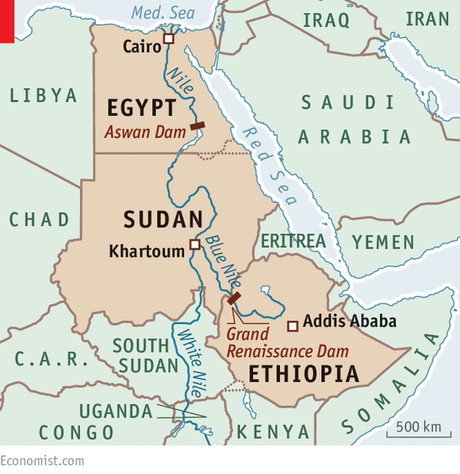
Concluding remarks
The leaders of Sudanese coup are well connected with powerful friends. In May 2019, Burhan’s first international trip was to Egypt to meet Abdel Fattah el-Sisi. Earlier he had military training in Egypt and Jordania. Today he is mostly supported by Egypt.
General Mohamed Hamdan Dagalo (Hemetti) traded camels prior to the War in Darfur, now he is the biggest gold trader in Sudan. This gave him considerable financial power in Sudan since gold trade constituted forty percent of Sudanese exports in 2017. In May 2019, Hemetti’s first international trip was to Saudi Arabia to meet Mohammad bin Salman, during which he stated: “Sudan is standing with the kingdom against all threats and attacks from Iran and Houthi militias.” He has been providing mercenaries for the Saudi war in Yemen, and is mostly supported by the United Arab Emirates (UAE) and Saudi Arabia.
Egyptian establishment has been providing financial, military, and diplomatic assistance to armed and unarmed Ethiopian forces in its bid to destabilize and weaken Ethiopia and thwart its ambition to utilize the resources of the Nile River. Egypt has been assisting the Gumuz militia in Ethiopia’s western Benishangul-Gumuz state, where the dam is located. According to the Ethiopian government, the sole aim of the Gumuz militia, which has been trying to block the main road leading to the dam, is to trigger a civil war in the region and beyond and eventually delay or thwart the dam’s construction.
Also, according to Ethiopian officials, Egypt tried to befriend the federal government of Somalia by promising military aid, but the Somali authorities refused it. After this Egypt turned to Somaliland, a self-ruling region that has been at loggerheads with the federal government. Egyptian policy is explained not only by the Blue Nile Water War (GERD), but also by the country’s quest to gain a foothold in the Horn of Africa and wider influence in the region.
Israel has kept a low profile regarding its relationship with Khartoum and the new junta and unlike most Western countries has not issued any statements against the military takeover of power. The silence can be seen as a sign of support for the military.
The position of Israel can be understood from a regional perspective. For decades, Egypt has been the main mediator in Israeli clashes with Hamas. Sudan is a major Arab country with which Israel seeks to normalize relations. Saudi Arabia and the Emirates are a significant part of the alliance against Israel’s main enemy – Iran.
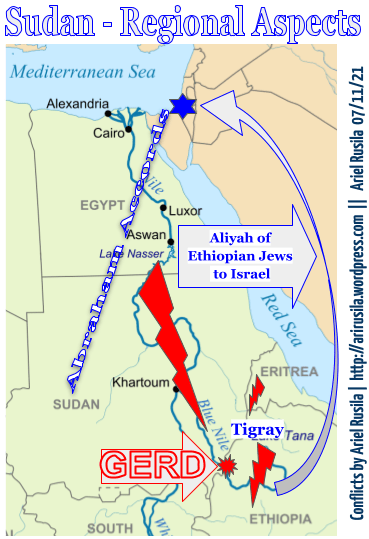
Sources e.g: intelnews , The New Arab , al-Jazeera , Africanews

